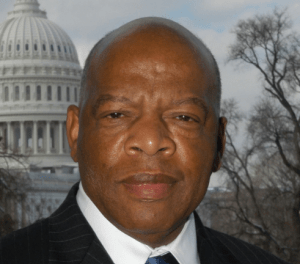 “Do not get lost in a sea of despair. Be hopeful, be optimistic. Our struggle is not the struggle of a day, a week, a month, or a year, it is the struggle of a lifetime. Never, ever be afraid to make some noise and get in good trouble, necessary trouble.”
“Do not get lost in a sea of despair. Be hopeful, be optimistic. Our struggle is not the struggle of a day, a week, a month, or a year, it is the struggle of a lifetime. Never, ever be afraid to make some noise and get in good trouble, necessary trouble.”
John Lewis, who died July 17, tweeted that in 2018. But he used the term “good trouble” a lot. I heard him recite it on The Daily Show with Jon Stewart back in 2015. In fact, there’s a new documentary, John Lewis: Good Trouble. It has been streaming since July 3, though I’ve not seen it yet.
I HAVE read March, Books 1-3, a series of graphic novels with Lewis as a co-author. It covers his life up to the twin victories of the Civil Rights Act of 1964 and the Voting Rights Act (VRA) of 1965. Then it fast-forwards to the inauguration of one Barack Obama.
A casual reading would suggest that Rosa Park refused to stand, Martin Luther King gave a speech, Obama was elected, and voila! We HAVE overcome. Of course, this was not true for a variety of reasons, including the mass incarceration fueled by the drug wars.
The war on voting
Worse, there has been a real retrenchment of voting rights. In 2013, the Supreme Court eviscerated a key provision of the VRA. Section 5 of the law required jurisdictions with a history of discrimination to obtain approval before changing voting rules.
The Court held in Shelby County v. Holder “since the coverage formula was last modified in 1975, the country ‘has changed, and while any racial discrimination in voting is too much, Congress must ensure that the legislation it passes to remedy that problem speaks to current conditions.'” In other words, IMO, the Court decided that America was post-racial.
Just this week, SCOTUS allowed limits on felon voting in Florida. This action was taken in spite of the wishes of a majority of Sunshine State voters.
Google voter suppression 2020. In Rolling Stone, read The Plot Against America: The GOP’s Plan to Suppress the Vote and Sabotage the Election. The Minnesota Daily reminds us that in 2018, “gubernatorial candidate Brian Kemp, then Georgia’s Secretary of State, was blocking 53,000 voter registrations in Georgia,” and essentially stole the election.
Wisconsin voters in 2020 were forced to cast their ballots in the midst of a pandemic. Long voter lines, often in communities of color, are the result of selectively closing polling booths. It’s critical to continue to fight for the right to vote and run for office.
I just sent some money to FairFight.com. Also, I’m supporting the HEROES Act to safeguard our elections regardless of the pandemic. This will allow millions of voters to vote safely this November. Related, support the United States Postal Service from someone’s personal animosity.
As someone once said, “If voting weren’t important, they wouldn’t spend so much time keeping us from doing so.”
Fortunately…
Right now, there are groups of people recognizing the systemic injustices that continue to take place in the United States. Many are young, though there are a few gray hairs among them. They are every racial and ethnic grouping you can imagine. The timing couldn’t be better. I’m sure they’ll easily be able to find their own issues to address.
As friend Arthur wrote: “To really honour the man, the country should rededicate itself to finishing Lewis’ life’s work. That’s not just the good and right thing to do, but a moral imperative, too.”
In his 2017 memoir, Across That Bridge: A Vision for Change and the Future of America, John Lewis wrote something we need to remember about the struggle. “Freedom is not a state; it is an act. It is not some enchanted garden perched high on a distant plateau where we can finally sit down and rest. Freedom is the continuous action we all must take, and each generation must do its part to create an even more fair, more just society.”
